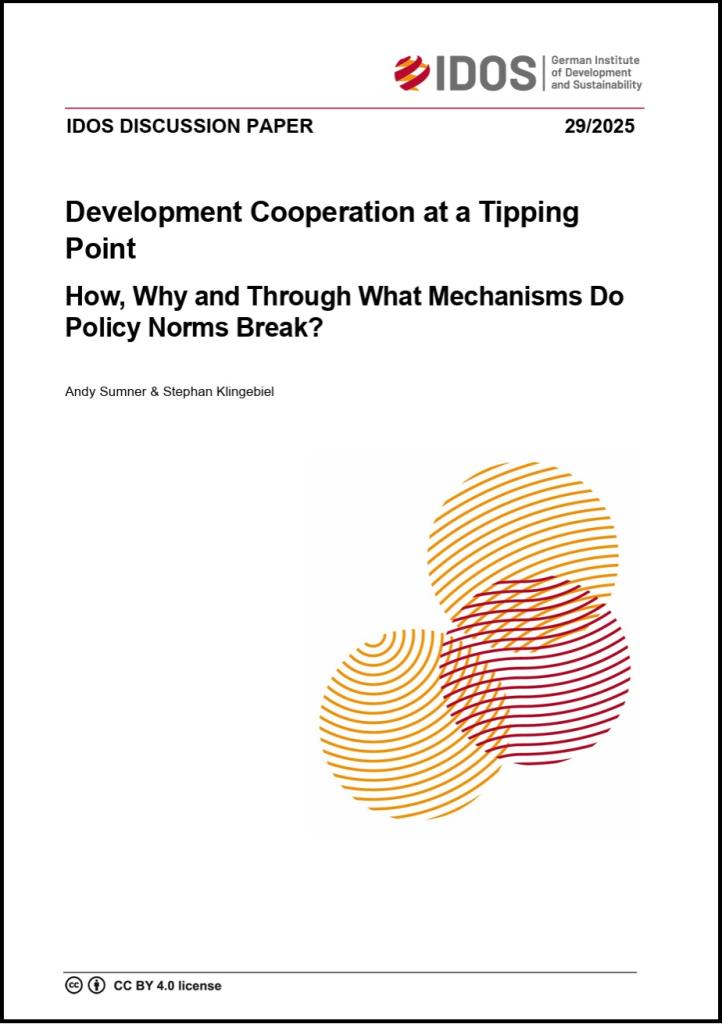Development Cooperation at a Tipping Point: How do policy norms break?

Stephan Klingebiel and Andy Sumner on the fragmentation of the global normative landscape and the need for pragmatic adaptation from policymakers.
The global system of development cooperation is entering uncertain territory. For decades, multilateralism and global solidarity shaped the expectations of how global development policy should be organised and justified. These norms provided a degree of stability, even if practice often fell short. In a new Discussion Paper we argue that those assumptions can no longer be taken for granted.
The paper makes the case that the return of Donald Trump to the US presidency is more than a shift in one country’s policies. It marks a potential normative tipping point in global development cooperation. To explain this, the paper sets out four key arguments that together describe how norms break, what replaces them, and why it matters.
 Normative Disruption & Tipping Point
Normative Disruption & Tipping Point
The return of Donald Trump to the presidency signals more than a change in policy priorities within the United States. It marks a normative tipping point for global development cooperation. The long-standing expectations that richer countries should act through multilateral institutions and uphold principles of solidarity with poorer countries are now openly challenged.
Multilateralism is weakened when one of the largest donors deliberately sidelines international organisations, and solidarity is undermined when development cooperation is framed not as obligation but as discretionary charity or transactional deal-making.
This shift matters because norms are not simply rhetoric; they set the boundaries of what is considered legitimate behaviour. If the US, long a central actor, rejects these expectations, their legitimacy erodes for others too. In this sense, Trumpism represents more than a domestic turn. It catalyses a global disruption of the normative order that has underpinned development cooperation since the early 2000s.
Mechanisms of Norm Breaking
The paper emphasises that norms do not collapse overnight. They erode through identifiable mechanisms.
Institutional processes such as layering add new practices that sit uneasily alongside old norms, drift allows norms to become irrelevant as contexts shift without adjustment, conversion repurposes institutions to serve different ends, and displacement establishes rival forums where alternative rules prevail.
Alongside these institutional mechanisms are shifts in narratives and framing. By redefining development cooperation as transactional or voluntary charity, actors alter how cooperation is understood. Contestation also occurs at the level of validity, as critics question whether solidarity is a legitimate expectation at all. Importantly, we highlight the role of norm antipreneurs or actors who do not merely resist quietly but actively and noisily seek to dismantle or reverse existing norms. In the current moment, the Trump administration exemplifies antipreneurship by using its power to block consensus, promote rival principles, and normalise resistance to the established order.
The “New Washington Dissensus”
To capture the normative project advanced under Trump, we develop the concept of the New Washington Dissensus. This describes a coherent, though fragmented, set of principles that stand in direct opposition to the consensus around multilateral solidarity that dominated the early 2000s.
Five elements define it. First, ideological vetting, where recipients are screened for alignment with US political priorities. Second, migration and border control, making cooperation conditional on policies that restrict mobility. Third, exclusion of climate and DEI agendas, rejecting global commitments that had been central to multilateral discourse. Fourth, transactionalism of aid, where assistance is explicitly tied to bargains and quid pro quos. Finally, distancing from multilateral institutions, with funding cuts and withdrawals signalling a preference for bilateral or selective arrangements.
Taken together, these principles constitute not simply ad hoc measures but a structured dissensus: a rival normative order that challenges the legitimacy of the older consensus on global cooperation.
A Plural and Fractured Normative Landscape
The disruption not amount to the wholesale collapse of global development cooperation. Instead, what emerges is a fragmented landscape in which multiple normative regimes coexist and compete.
We identify four broad forms or competing regimes of development cooperation.
First, there is Liberal multilateralism which may persists, centred on existing UN and OECD institutions and upheld by those donors still committed to collective action.
Second, nationalist conditionality, exemplified by the New Washington Dissensus, prioritises bilateral bargains and national interest over solidarity.
Third, pluralist cooperation, associated with South–South initiatives, promotes partnerships framed as more horizontal, though not free of geopolitics.
And fourth, strategic multilateralism reflects attempts by coalitions of states to defend or adapt multilateral institutions under pressure.
The coexistence of these regimes produces complexity and unpredictability. Recipient countries face competing expectations; donors operate with divergent logics; and coordination becomes harder to sustain. The result is not a simple breakdown but a fractured normative order, where the rules of development cooperation are increasingly contested, selective, and unstable.
So what? Here’s the rub
Taken together, these points underline that the norms which once provided stability and direction for development cooperation are no longer secure. The second Trump administration is not just another episode of US exceptionalism; it is a catalyst for wider normative disruption.
By questioning solidarity, dismantling support for multilateralism, and promoting a nationalist conditionality regime, Trumpism demonstrates how a powerful actor can accelerate erosion and legitimise alternatives.
Yet the broader story is not one of simple collapse but of fragmentation. Multiple regimes now coexist each carrying different expectations, institutions, and practices.
For policymakers, this fractured landscape poses a central challenge: how to navigate competing normative logics without losing sight of the global public goods that demand collective action, from climate stability to health security.
Here’s the rub: Aligning strategies with one regime may limit room to manoeuvre in another, and coordination across fragmented systems is harder to sustain. The need for pragmatic adaptation sits uneasily alongside the risk of deepening incoherence.
Norms are being contested, broken, and reassembled in real time. This requires close attention to the mechanisms of change or how institutional layering, drift, conversion, or displacement interact with shifts in narratives to reshape what development cooperation means in practice. What is at stake is not only the trajectory of aid or development finance but the broader capacity of the international system to sustain itself in a more divided and contested world.
Stephan Klingebiel heads the research program “Inter- and Transnational Cooperation” at the German Institute of Development and Sustainability (IDOS). He previously led the UNDP Global Policy Centre in Seoul (2019–2021) and the KfW Development Bank’s office in Kigali, Rwanda (2007–2011). He is also a guest professor at the University of Turin, Italy, a senior lecturer at the University of Bonn, and an Honorary Distinguished Fellow at Jindal University, India.
Andy Sumner is Professor of International Development at King’s College, London, and President of European Association of Development Research and Training Institutes. He is also a Senior Non-Resident Research Fellow at the United Nations University World Institute for Development Economics Research and the Center for Global Development; and a Fellow of the Academy of Social Sciences and the Royal Society of Arts.
Photo by Samet Burak Dağlıoğlu


